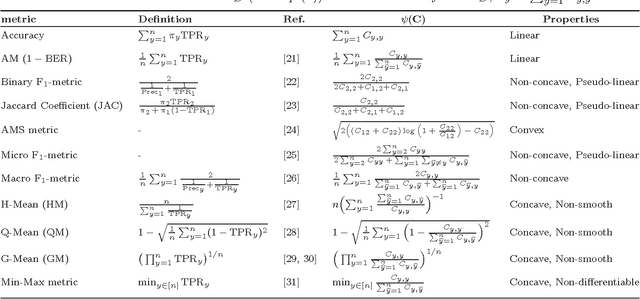Consistent Classification Algorithms for Multi-class Non-Decomposable Performance Metrics
Paper and Code
Jan 01, 2015

We study consistency of learning algorithms for a multi-class performance metric that is a non-decomposable function of the confusion matrix of a classifier and cannot be expressed as a sum of losses on individual data points; examples of such performance metrics include the macro F-measure popular in information retrieval and the G-mean metric used in class-imbalanced problems. While there has been much work in recent years in understanding the consistency properties of learning algorithms for `binary' non-decomposable metrics, little is known either about the form of the optimal classifier for a general multi-class non-decomposable metric, or about how these learning algorithms generalize to the multi-class case. In this paper, we provide a unified framework for analysing a multi-class non-decomposable performance metric, where the problem of finding the optimal classifier for the performance metric is viewed as an optimization problem over the space of all confusion matrices achievable under the given distribution. Using this framework, we show that (under a continuous distribution) the optimal classifier for a multi-class performance metric can be obtained as the solution of a cost-sensitive classification problem, thus generalizing several previous results on specific binary non-decomposable metrics. We then design a consistent learning algorithm for concave multi-class performance metrics that proceeds via a sequence of cost-sensitive classification problems, and can be seen as applying the conditional gradient (CG) optimization method over the space of feasible confusion matrices. To our knowledge, this is the first efficient learning algorithm (whose running time is polynomial in the number of classes) that is consistent for a large family of multi-class non-decomposable metrics. Our consistency proof uses a novel technique based on the convergence analysis of the CG method.
 Add to Chrome
Add to Chrome Add to Firefox
Add to Firefox Add to Edge
Add to Edge